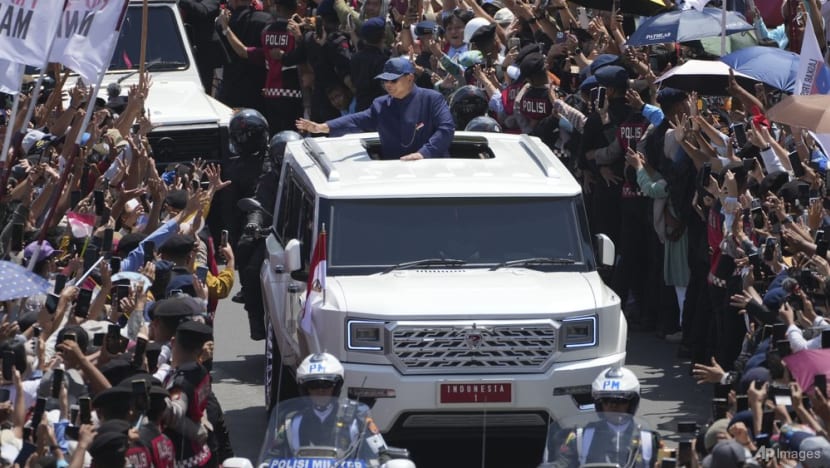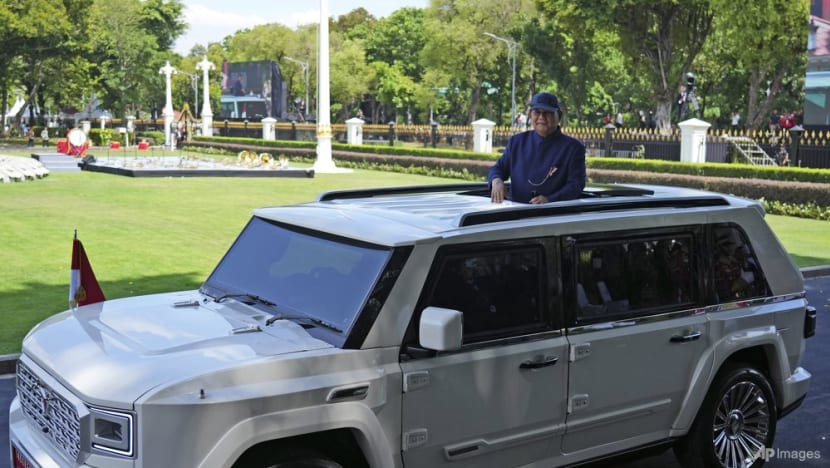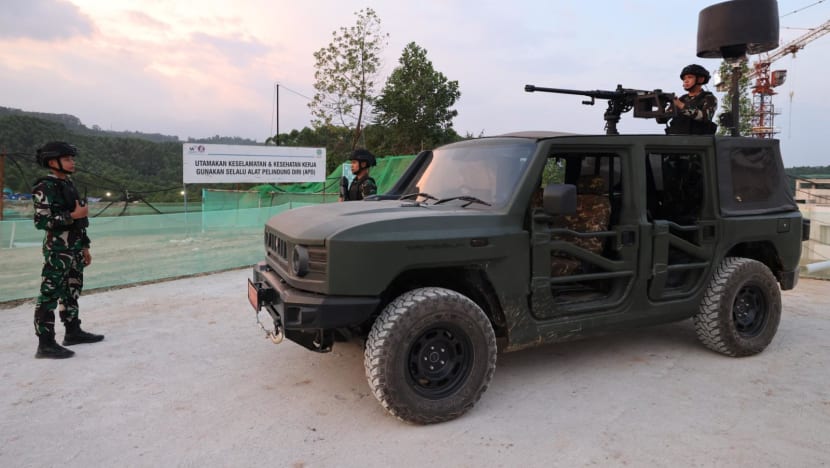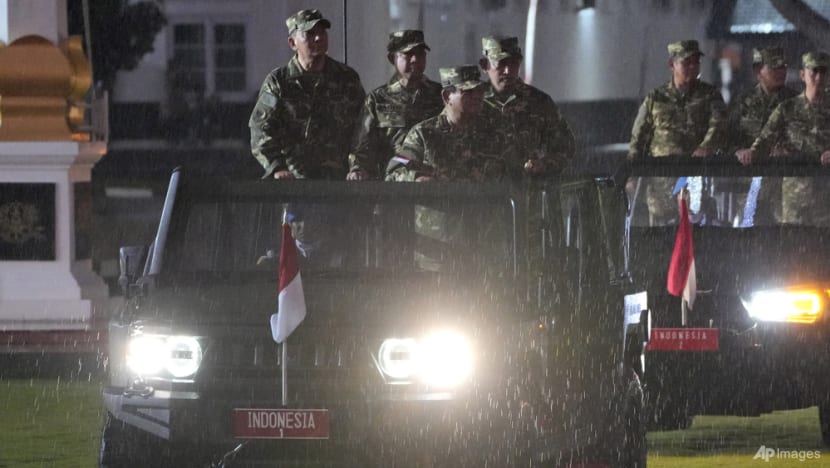Indonesia is revving up its ambition to have a national car. Can a weapons firm deliver?
All senior government officials are to start using a car built by state-owned munitions company Pindad. This has stoked national pride, but analysts point to a long road ahead.


This audio is generated by an AI tool.
JAKARTA: When Mr Prabowo Subianto arrived for his inauguration at the Indonesian parliament complex in Jakarta on Oct 20, he was seen using a white Toyota Alphard multi-purpose vehicle (MPV).
But by the time he emerged as Indonesia’s eighth president, a different ride was waiting for him at the lobby: a Maung Garuda.
With its imposing size and boxy shape, the white tactical sport utility vehicle (SUV) – dubbed the RI1 – looked more at home in combat zones than the busy streets of Jakarta.
The resemblance comes as no surprise as the Maung Garuda is produced by Pindad, a state-owned company that makes weapons, armaments and tactical vehicles for the Indonesian military and police force.
Mr Prabowo has made the Maung Garuda his presidential car and a week after he took office, he instructed all ministers, vice-ministers, government agency chiefs and senior government officials to also make the SUV their official vehicle.
The choice is a departure from the stretch Mercedes-Benz limousines used by previous presidents and the Toyota MPVs and SUVs favoured by ministers.
Presidential spokesman Hasan Nasbi said on Oct 28 that Mr Prabowo, a former military general and defence minister, wanted his cabinet members to use locally-produced cars as opposed to imported ones.
“(Mr Prabowo) is proud to be using Maung Garuda Limousine as his official car,” he said, as quoted by Detik news website.
The president has also said that he wants Indonesia to be self-sufficient and push for a homegrown automotive industry, among other things.
“To be honest, in my heart, I refuse to accept that the world’s fourth (most populous) nation, a nation blessed by God with tremendous (natural) wealth... cannot produce its own cars, cannot produce its own motorcycles, cannot produce its own computers,” Mr Prabowo told a regional leaders’ convention on the outskirts of Jakarta on Nov 7.

One of Mr Prabowo’s campaign promises is to create 19 million jobs during his presidency and a way to do that is to boost Indonesia’s manufacturing sector.
“A president prioritising the use of local brands is a positive step,” said Dr Tauhid Ahmad, a senior researcher at the Jakarta-based think tank Institute for Development of Economics and Finance (INDEF).
“This is not only about national pride. Maximising the use of local brands can also invigorate the domestic industry and ultimately create a multiplier effect which spurs growth in multiple sectors.”
Pindad has sourced 70 per cent of Maung components locally, according to Presidential Chief of Staff Anto Mukti Putranto, as quoted by news outlet The Jakarta Post.
Remaining parts including the chassis, engine and base frame are sourced from foreign companies including South Korea’s Ssangyong, Japan’s Toyota and Germany’s Mercedes-Benz, it reported.
Although electric vehicles (EVs) are catching on in Indonesia, the company mainly produces internal combustion engine military vehicles and does not have experience in making EVs.
The road to a viable national car industry will be strewn with challenges, analysts warned, and many countries have tried and failed to build products that can compete with more established global brands.
Can a munitions company with little experience in the car industry live up to these challenges?
A HISTORY OF FAILED VENTURES
Mr Prabowo is not the only Indonesian president with dreams of building a local car brand.
Indonesia’s first president Sukarno, for example, established PT Industri Mobil Indonesia in 1962 with the goal of producing Indonesia’s first national car.
However, before production began, Indonesia descended into a widespread civil unrest in 1965 which saw the killing of more than 500,000 members and sympathisers of the Indonesian Communist Party.
Attempts to produce a national car were revived under Suharto, who in the 1990s offered tax exemptions for cars that were entirely built domestically.
The move was panned both at home and abroad as Indonesian car brands that enjoyed the exemption were found to be rebranded versions of popular models developed by foreign companies.
After Suharto stepped down in 1998, Indonesia made several attempts at producing a national car. Most stopped at the prototype stage.
After Suharto, there has been very little support given to Indonesian companies developing their own cars, said Mr Bebin Djuana, an automotive industry expert.
“These companies need the government’s support. If these companies are told to fend for themselves amid stiff competition from more established brands, they are done for,” said Mr Bebin, a retired car company executive who has written several books on Indonesia’s car industry.
He said other countries have been giving local players anything from fiscal incentives and better access to loans and subsidies, to fast-tracking permit issuance and certification. They also created demand for the products before they successfully developed their national car industry.
Malaysia, for example, provided RM13.9 billion (US$3.1 billion) in research and development grants, stimulus packages and tax incentives to Proton since its establishment between 1983 and 2017.
These benefits allowed Proton to develop new models at prices lower than its competitors, which had to pay import taxes for fully assembled units or parts shipped from overseas.
“Some countries give huge subsidies to first-time car owners if they buy local brands. Some governments buy the cars produced by local companies and use them as official cars and operational vehicles,” Mr Bebin told CNA.
These government incentives remain available through regime changes, something that is missing in Indonesia, where leaders tend to focus on their own policies instead of continuing their predecessors’ legacies.
“These countries remain consistent (in their support) particularly during the critical early stages of these local companies. Without (consistency) these companies would collapse and they would have to start from scratch,” Mr Bebin said.
The Malaysian government continued to provide grants and tax incentives after Malaysian sovereign wealth fund Khazanah Nasional divested its Proton stake to conglomerate DRB-HICOM for RM1.29 billion in 2012.
However, the benefits stopped after the latter sold its 49.9 per cent Proton stake to Chinese manufacturer Zhejiang Geely Automobile Holdings in 2017.
Dr Tauhid of INDEF believed that Pindad will enjoy similar support from the Indonesian government.
“As a state-owned company, it will have the full support of the government in terms of regulatory protection (from competition) and various incentives. It will have access to government funding or low interest loans from state-owned banks,” he said.
“This is what sets Pindad apart from private companies of the past which tried to develop their own car brands.”
It is still not clear what financial support Indonesia will provide to Pindad, which can currently only produce a small batch of several thousand cars a year, in order to become a well-established car brand.
“The government needs to formulate a long-term strategy to help Pindad grow. So far, we haven’t seen such a strategy,” Dr Tauhid said.

COMPLEX CHALLENGES
But government support alone does not guarantee success in the cut-throat automotive business.
“Building a car involves a complex supply chain of parts and raw material. It involves acquiring cutting-edge technologies and production techniques which may be patented,” said Dr Piter Abdullah, director of the think tank Segara Research Institute.
Building a car also takes years of research and development, he continued, and such workers need to be attracted with big salaries and bonuses.
Vietnam’s VinFast was able to overcome these challenges because it has the backing of the country’s biggest conglomerate Vingroup and its founder, Vietnam’s richest man Pham Nhat Vuong.
Since its inception in 2017, VinFast has received capital injections totalling US$13.5 billion from its parent company, Mr Vuong and his affiliates. VinGroup has pledged to invest US$3.4 billion more over the next two years.
The huge investment allowed the company to become a key player in Vietnam’s electric car market in a short period of time. The company also expanded its reach beyond the domestic market and now has a presence in North America, Europe and several Asian countries.
But even after the investment and aggressive expansion, VinFast is still operating at a loss.
According to a December 2023 filing with the United States’ Security Exchange Commission, the Nasdaq-listed company reported net losses of US$2.4 billion last year, up 14.7 per cent from 2022.
Losing money is a risk Indonesia has to take if it wants to realise its national car ambition through a munitions company with little experience in selling consumer vehicles.
“It is not easy to build a car that sells, especially given the fact that it has to compete with other foreign brands which have dominated the market for decades,” Mr Bebin said.
To do this, Pindad must either recruit people with deep understanding of what the mass market wants, or partner with more established manufacturers.
Before a 49.9 per cent stake of Malaysia’s Proton was sold to Chinese manufacturer Geely in 2017, it engaged in manufacturing and components sharing partnership with Mitsubishi and a co-branding deal with Suzuki.
Meanwhile, Malaysia’s second national car manufacturer Perodua is currently partnering with Daihatsu for the production and sales of one of its compact SUV models.
BABY STEPS
There are only four Maung Garuda SUVs roaming Indonesia’s streets today: Two belonging to Mr Prabowo and two used by vice-president Gibran Rakabuming Raka.
The presidential vehicles are equipped with an armoured body capable of stopping a 7.62mm round and a set of anti-flat tires along other amenities such as two 12-inch flat screen televisions and electric footsteps for easy access.
According to Pindad’s website, the Maung Garuda weighs 2.9 tonnes. It is 5.1 metres long, 2 metres wide and 1.8 metres tall. Its 2.5-litre engine is capable of producing 199 horse power with a top speed of 100kph.
It is not known how much the vehicle costs, although several media outlets predicted that the presidential version should cost at least 1.2 billion rupiah (US$75,310).
It is not known if Pindad is keeping the same specification for the 10,000 or so cars to be produced for ministers and senior government officials.
Pindad president director Abraham Mose said he is grateful Mr Prabowo has chosen the Maung Garuda as the official vehicle for himself and his officials.
“President Prabowo Subianto has shown his commitment to local industry by providing Pindad with the opportunity to enter the automotive industry,” Mr Abraham said in a statement on Nov 3.

On top of the 10,000 units commissioned by the presidential office, the defence ministry has also placed an order of 4,600 Maung Garuda vehicles for its operational needs.
Indonesia’s state-owned enterprises minister Erick Thohir said at its current production capacity, it would take Pindad two years to meet these orders.
“(Pindad’s) production line needs managing,” he said on Nov 3, as quoted by CNBC Indonesia, adding that the government is ready to give Pindad what it needs to upgrade its production capacity.
While the orders will keep Pindad busy for the next two years, Pindad needs to constantly improve its product if it wants to one day sell its vehicles to the general public.
The Maung Garuda is its only civilian car model, while the rest of its line-up comprises specialised military and police vehicles with thick metal platings and machine gun mounts and turrets.
In March, Detik reported that Pindad had struck a deal with a Jakarta-based car dealership to exclusively sell the Maung Garuda but it is not yet known when the SUV will be available to the general public.
The only other Indonesian car brand in production today is Solo Manufaktur Kreasi, better known as Esemka. The company produces vans and small pick-up trucks which are rebrands of China’s Shangan and Shineray.
“Pindad will get feedback from their users on what features to add or how their product compares to Japanese or European cars. With improvements and adjustments, Pindad will in time be ready to enter the public market,” Dr Tauhid of INDEF said.
“But first, it needs to keep making cars and be profitable, and the government needs to keep the orders coming.”




















